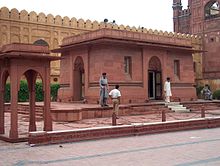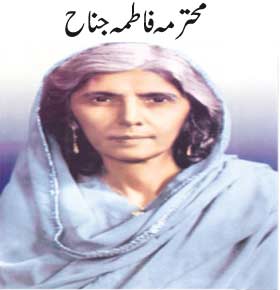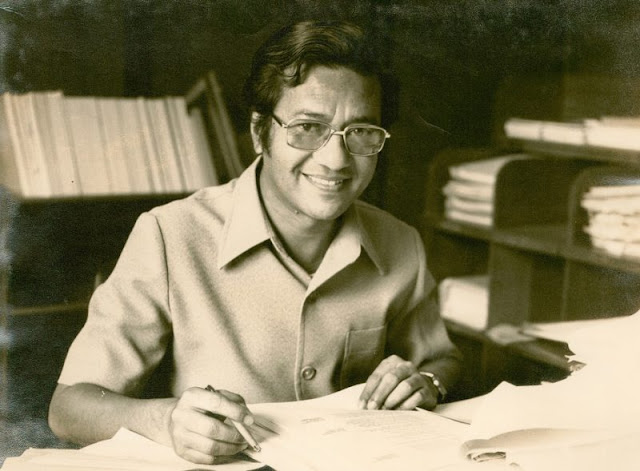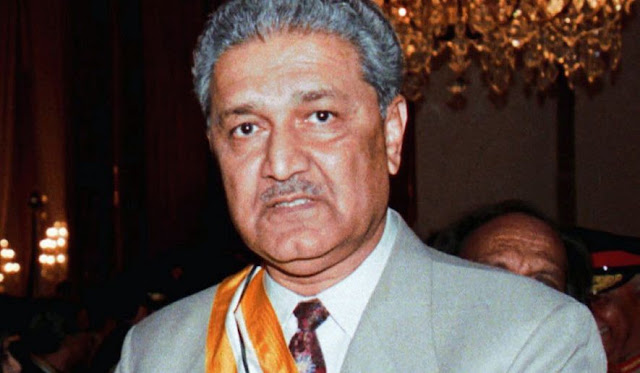 |
Allama Muhammad Iqbal
|
Sir Muhammad Iqbal 9 November1877 – 21 April 1938), widely known as Allama Iqbal, was a poet, philosopher, and politician, as well as an academic, barrister and scholar in British India who is widely regarded as having inspired the Pakistan Movement. He is called the "Spiritual Father of Pakistan." He is considered one of the most important figures in Urdu literature, with literary work in both Urdu and Persian. Iqbal is admired as a prominent poet by Pakistanis, Indians, Bangladeshis, Iranians and other international scholars of literature. Though Iqbal is best known as an eminent poet, he is also a highly acclaimed "Muslim philosophical thinker of modern times". His first poetry book, The Secrets of the Self, appeared in the Persian language in 1915, and other books of poetry include The Secrets of Selflessness, Message from the East and Persian Psalms. Amongst these, his best known Urdu works are The Call of the Marching Bell, Gabriel's Wing, The Rod of Moses and a part of Gift from Hijaz. Along with his Urdu and Persian poetry, his Urdu and English lectures and letters have been very influential in cultural, social, religious and political discourses. In 1922 New Years Honours, he was made a Knight Bachelor by King George V, While studying law and philosophy in England, Iqbal became a member of the London branch of the All-India Muslim League. Later, during the League's December 1930 session, he delivered his most famous presidential speech known as the Allahabad Address in which he pushed for the creation of a Muslim state in north-west India.
In much of South Asia and the Urdu-speaking world,
1 ) Iqbal is regarded as the Shair-e-Mashriq (Urdu: شاعر مشرق, "Poet of the East").
2 ) He is also called Mufakkir-e-Pakistan (Urdu: مفکر پاکستان, "The Thinker of Pakistan"),
3 ) Musawwar-e-Pakistan (Urdu: مصور پاکستان, "Artist of Pakistan")
4 ) Hakeem-ul-Ummat (Urdu: حکیم الامت, "The Sage of the Ummah").
The Pakistan government officially named him "National Poet of Pakistan" His birthday Yōm-e Welādat-e Muḥammad Iqbāl (Urdu: یوم ولادت محمد اقبال), or Iqbal Day, is a public holiday in Pakistan. Iqbal's house is still located in Sialkot and is recognized as Iqbal's Manzil and is open for visitors. His other house where he lived most of his life and died is in Lahore, named as Javed Manzil. The museum is located on Allama Iqbal Road near Lahore Railway Station, Punjab, Pakistan. It was protected under the Punjab Antiquities Act of 1975and declared a Pakistani national monument in 1977.
Personal life
__________________________________________________________________________________
( i ) Background
Iqbal was born on 9 November 1877 in an ethnic Kashmiri family in Sialkot within the Punjab Province of British India (now in Pakistan). His family was Kashmiri Brahmin Sapru which had converted to Islam. In the 19th century, when the Sikh Empire was conquering Kashmir, his grandfather's family migrated to Punjab. Iqbal often mentioned and commemorated his Kashmiri lineage in his writings.
 |
Allama Iqbal with his son Javed Iqbal in 1930
|
 |
Iqbal's mother, who died on 9 November 1914.Iqbal
expressed his feeling of pathos in a poetic form after
her death.
|
Iqbal'sfather, Sheikh Noor Muhammad (died 1930), was a tailor, not formally educated, but a religious man. Iqbal's mother Imam Bibi, a Punjabi Muslim from Sialkot, was described as a polite and humble woman who helped the poor and her neighbours with their problems. She died on 9 November 1914 in Sialkot. Iqbal loved his mother, and on her death, he expressed his feelings of pathos in a poetic form elegy.
Who would wait for me anxiously in my native place? Who would display restlessness if my letter fails to arrive? I will visit thy grave with this complaint: Who will now think of me in midnight prayers? All thy life thy love served me with devotion— When I became fit to serve thee, thou hast departed.
( ii ) Early education
Iqbal was four years old when he was admitted to a mosque to learn about the Qur'an. He learned the Arabic language from his teacher, Syed Mir Hassan, the head of the madrasa and professor of Arabic at Scotch Mission College in Sialkot, where he matriculated in 1893. He received Intermediate with the Faculty of Arts diploma in 1895. The same year he enrolled at Government College University, where he obtained his Bachelor of Arts in philosophy, English literature and Arabic in 1897, and won the Khan Bahadurddin F.S. Jalaluddin medal as he performed well in Arabic. In 1899, he received his Master of Arts degree from the same college and had the first place in University of the Punjab.
( iii ) Marriages
Iqbal married thrice, under different times of need and circumstances. His first marriage was held in 1895 when he was 18 years old. His bride Karim Bibi was the daughter of a physician, Khan Bahadur Ata Muhammad Khan. Her sister was the mother of director and music composer Khwaja Khurshid Anwar. The marriage was arranged by their families, and the couple had two children; a daughter Miraj Begum (1895–1915) and a son, Aftab Iqbal (1899–1979) who became a barrister. Another son is said to have died after birth in 1901. Iqbal's second marriage was with Mukhtar Begum and it was held in December 1914, shortly after the death of Iqbal's mother the previous November. They had a son, but both the mother and son died shortly after birth in 1924. Later, Iqbal married Sardar Begum and they became the parents of a son, Javed Iqbal (1924–2015), who was to become a judge, and a daughter Muneera Bano (b. 1930). One of Muneera's sons is the philanthropist-cum-socialite Yousuf Salahuddin.
( iv ) Higher education in Europe
Iqbal was influenced by the teachings of Sir Thomas Arnold, his philosophy teacher at Government College Lahore. Arnold's teachings convinced Iqbal to pursue higher education in the West, and in 1905, he travelled to England for that purpose. Iqbal qualified for a scholarship from Trinity College, University of Cambridge and obtained Bachelor of Arts in 1906, and in the same year, he was called to the bar as a barrister at Lincoln's Inn. In 1907, Iqbal moved to Germany to pursue his doctoral studies and earned a Doctor of Philosophy degree from the Ludwig Maximilian University of Munich in 1908. Working under the guidance of Friedrich Hommel, Iqbal's doctoral thesis was entitled The Development of Metaphysics in Persia.
In 1907, he had a close friendship with the writer Atiya Fyzee in both Britain and Germany. Atiya would later publish their correspondence. While Iqbal was in Heidelberg in 1907 his German professor Emma Wegenast taught him about Goethe's Faust, Heine and Nietzsche. During his study in Europe, Iqbal began to write poetry in Persian. He preferred to write in this language because doing so made easier to express his thoughts. He would write continuously in Persian throughout his life.
Iqbal had a great interest in Islamic studies, especially Sufi beliefs. In his poetry, apart from independence ideologies, he also explores concepts of submission to Allah and following the path of Prophet Muhammad.
( v ) Academic career

Photograph taken during Allama Iqbal's youth in 1899
Iqbal, after completing his Master of Arts degree in 1899, began his career as a reader of Arabic at Oriental College and shortly afterwards was selected as a junior professor of philosophy at Government College Lahore, where he had also been a student in the past. He worked there until he left for England in 1905. In 1908, he returned from England and joined the same college again as a professor of philosophy and English literature. In the same period Iqbal began practising law at Chief Court Lahore, but he soon quit law practice and devoted himself in literary works, becoming an active member of Anjuman-e-Himayat-e-Islam. In 1919, he became the general secretary of the same organisation. Iqbal's thoughts in his work primarily focus on the spiritual direction and development of human society, centred around experiences from his travels and stays in Western Europe and the Middle East. He was profoundly influenced by Western philosophers such as Friedrich Nietzsche, Henri Bergson, and Goethe. He also closely worked with Ibrahim Hisham, during his stay at the Aligarh Muslim University.
The poetry and philosophy of Mawlana Rumi bore the deepest influence on Iqbal's mind. Deeply grounded in religion since childhood, Iqbal began concentrating intensely on the study of Islam, the culture and history of Islamic civilisation and its political future, while embracing Rumi as "his guide". Iqbal would feature Rumi in the role of guide in many of his poems. Iqbal's works focus on reminding his readers of the past glories of Islamic civilisation and delivering the message of a pure, spiritual focus on Islam as a source for socio-political liberation and greatness. Iqbal denounced political divisions within and amongst Muslim nations, and frequently alluded to and spoke in terms of the global Muslim community or the Ummah.
Iqbal's poetry was translated into many European languages in the early part of the 20th century when his work was famous. Iqbal's Asrar-i-Khudi and Javed Nama were translated into English by R. A. Nicholson and A. J. Arberry, respectively.
( vi ) Career as a Lawyer
Iqbal was not only a prolific writer but was also a known Advocate. He used to appear before the Lahore High Court in both civil and criminal matters. There are more than 100 reported judgments to his name.
( vii ) Final years and death

The tomb of Muhammad Iqbal at the entrance of the Badshahi Mosque in Lahore
In 1933, after returning from a trip to Spain and Afghanistan, Iqbal suffered from a mysterious throat illness. He spent his final years helping Chaudhry Niaz Ali Khan to establish the Dar ul Islam Trust Institute at Jamalpur estate near Pathankot, where there were plans to subsidise studies in classical Islam and contemporary social science. He also advocated for an independent Muslim state.
Iqbal ceased practising law in 1934 and was granted a pension by the Nawab of Bhopal. In his final years, he frequently visited the Dargah of famous Sufi Ali Hujwiri in Lahore for spiritual guidance. After suffering for months from his illness, Iqbal died in Lahore on 21 April 1938. His tomb is located in Hazuri Bagh, the enclosed garden between the entrance of the Badshahi Mosque and the Lahore Fort, and official guards are provided by the Government of Pakistan.














Comments
Post a Comment
Thank you is much. I appreciate it to you and be happy to give me little pressure to upload more blogs. Be my follow